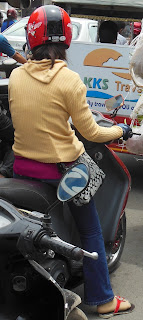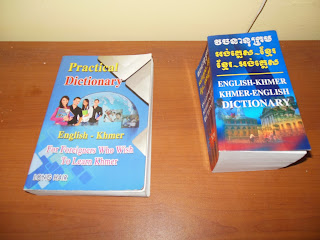This morning, as I do on many a Saturday morning, I set out
to get groceries. Today I had a special
mission: to buy ingredients for mashed potatoes.
We have a pot luck at church tomorrow for Thanksgiving, so we’re making
some solidly American comfort food.
(This church is English-speaking and most people either are North
American or have lived there at some point.)
I was asked to bring a potato dish, so I picked mashed potatoes.
First, I went to the Western grocery store. The recipe I found called for cream cheese,
which seemed excessive to me until I was in the dairy aisle, eying it
longingly. Do you know how many months
it’s been since I had cream cheese? (OK,
actually only one since I was home last month, but I think I’ve only bought it
once before in Cambodia, years ago.) I
stood there looking at the packages: $5
for 8 ounces (250 grams)? Wow, that’s painful.
Then I spotted the giant packages: $11 for a whole
kilogram. That’s just over half the
price per unit of a small package. My
mind began to calculate the possibilities.
Cheesecake. Carrot cake with
cream cheese frosting. Cream cheese
cookies. How long will it stay
good? Will it be grainy like the kind my
roommate bought once last year? How much
do I care? I decided to spring for it,
ignoring the fact that I’ll be away next weekend with no time to bake, hoping
my roommates could find uses for it as well.
Along with some oats and milk, I loaded it into my bicycle basket and
headed to the market.
I parked in front of my usual fruit vendor stand and headed
inside to the vegetable stalls. The
college girl that I always buy from laughed at me for setting potato after
potato into the little plastic basket she’d passed me. “I’m going to a party tomorrow,” I
explained. “In America this week is
Holiday of Thanks.” (I made up that
phrase… I hope it made sense in Khmer.)
She helped me pick through and find the nicest potatoes, adding one to
make it an even two kilograms. “Ten
thousand riel,” she told me. Two dollars
and fifty cents – good thing they’re cheaper than the cream cheese!
I still have some fruit at my house from last weekend, but I
felt bad since the fruit girl had been watching my bicycle for me. So I went for the “Christmas oranges,” which
only appear around this time of year.
They’re like mini-Clementines, sweet and juicy, and they’re cheaper now
than usual: 7000 riel ($1.75) per kilo.
Since my bike basket was full from the supermarket, I slipped the bag of
potatoes over my right handlebar and the oranges over my left for the quick
trip home.
Just after I passed through the nearby traffic light, the
potatoes’ weight burst through the flimsy plastic bag, sending them
scattering. I veered over to the
shoulder and watched in dismay as big SUV’s came barreling through, potatoes
bouncing under their tires. Could they
be salvaged? I needed to leave soon for
a Student Council meeting and didn’t have time to return to the market. With a helpless expression, I groaned to the
middle-aged tuk-tuk driver watching me from the corner. “Two kilos of potatoes! My bag broke!”
He looked at the road thoughtfully, then darted out into
traffic, scooping them up as hordes of cars began to part around him. Good thing Cambodian traffic moves so slowly
and drivers are used to interruptions like this. Once his hands were full, he gestured to me
to come pick up the rest, all the while holding out his potato-laden arms to
direct the oncoming traffic around me.
Except for one that had been squashed under tires, we got them safely
back to my bike, which of course had overwhelmed the kickstand and tipped over,
dumping my remaining groceries. He and
the other tuk-tuk drivers laughed at me for that, but I didn’t care – I was
just so glad to have my potatoes back and be spared another trip.
I didn’t even know that driver, though I’m
sure he always sees me riding past him.
I hadn’t expected he’d actually help me – it kind of seemed like a lost
cause. And I wouldn’t have been brave
enough by myself to pick up all those potatoes, all over the road, with that
much traffic.
I’m looking forward to mashed potatoes and other tastes of
home tomorrow. I’m looking forward to
cream cheese delights in all shapes and sizes.
I have a lot of reasons to smile today, but my biggest one is that
driver.
Sometimes Cambodians are really, really nice when they don't need to be.























